Six Lessons From The Edge Of The World
A reflection in words and pictures
Please do read or scroll to the bottom for a beautiful invitation, especially if you live in Scotland. I feel so lucky to be able to help facilitate it.
To go somewhere new is a good opportunity to drop your big ideas, your fiercely held together self and its ‘Oh, I already know best’ stories, its demands, its defeats, its disappointments, and to let something else take over. At least, that’s what I discovered last week. Two long days driving all the way up, up, up, right into Scotland’s Highlands, flat land slowly replaced by green mountains that grew and grew and grew until they were all I could see, until my breath caught and my eyes ran, and I arrived at our retreat house dumbstruck, spent, empty: a perfect state to be filled back up again.
Turadh means ‘a break in the clouds between showers’ — a fitting name for a collection of three properties on Scotland’s West Coast, established specifically to offer a place of rest and renewal to worn-out people working for ‘the common good’ in Scotland, an invitation that was also extended to me. The homes aren’t run as a business; instead people who stay there are asked to make a financial contribution based on their need and means. Sophie and Sarah — genuine, real-life angels of this world — encouraged me and family to come and stay as a gift, a generosity I struggled to feel deserving of until I arrived at the cabin they’ve named Taigh Whin — ‘Gorse House.’ Standing on unsteady legs by its wide windows overlooking Glenelg Bay and the towering Isle of Skye, something cracked open in me, shaking, new.
Here’s what I learned there.
On deserving and receiving
You have to choose to deserve something. You have to say yes when something good is offered, simply and directly. Wondering whether you deserve it or not is just another way of saying no. It is a waste of a gift; a rejection of everything a generous world wants to give you.
I was caught unprepared by the waves of undeserving that rocked me when I arrived. I couldn’t work out why I was trembling or why I felt so vulnerable, my chest pulling in like a closed shutter. “This is all too nice, all too nice for me, I shouldn’t get to have such nice things” is an old, old story my brain repeats. I caught it singing its old song in my head as I shuffled around, struggling to take it all in. Here I was in the most beautiful place I’d ever been and I felt myself begin to lock up tight.
Stop. No. Look up. Look at this view. If ever there was a time to say yes, it’s now.
Yes to this moment, this gift, this place, this world. Yes yes yes. To let that poisonous old script win would be the deepest, most ungrateful rejection of all. I refused its sly, pernicious voice with all my strength. I chose, instead, to accept the gift that had been offered to me, with nothing but thanks, nothing but yes.
To let go of an old story is always frightening, painful, wonderful, humbling.
It is always the right thing to do.
On finding ways to connect and move closer
I discovered quickly that something about a big, heart-gulping view can freeze you in place. Yes, beauty can make you passive. How easy it is to become an observer and nothing else.
I am not used to such a spectacle and, for a while, I felt pinned to the spot by it. There was so much world. The mountains formed a long sweeping cradle around us, so high that clouds frequently got stuck trying to pass over their peaks, a perfect echo of the sheeps’ wool caught on the fences outside. The bay stretched below, calm and quiet and silver. I was so overawed, I shrank at first, feeling small, unsure how to approach, how to proceed.
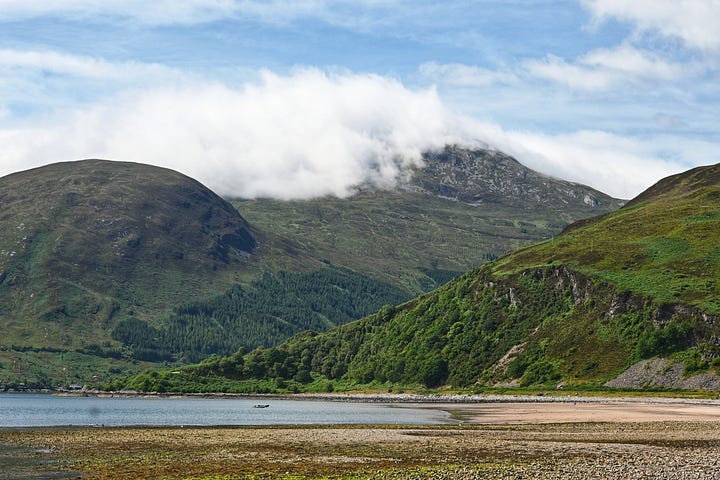
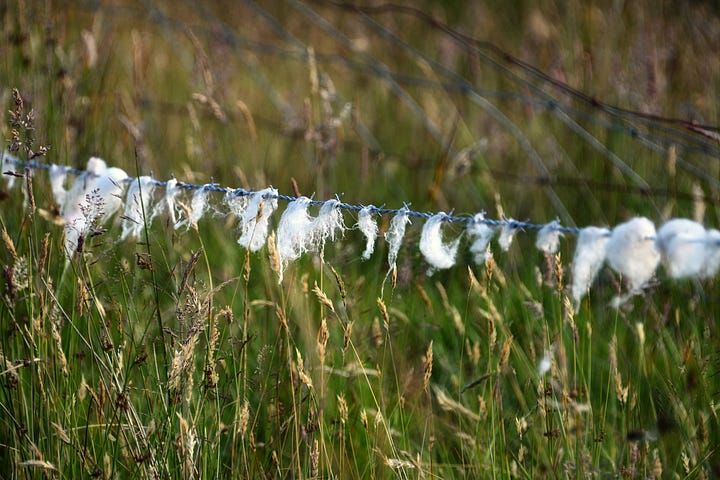
I spent the first couple of days sitting quietly with it, letting it soak into me like water through cloth. On the second day, sitting in meditation, feeling the land and sea whispering around me, the message was clear: time to move closer. Time to look deeper, to introduce myself, to respond, not to just stand on the edges, consuming.
The limitations of both my body and my wheelchair make it hard for me to physically explore wild places up close, but then that’s why I make art. That’s what art is to me: a way to move closer to something with my whole self, to offer an active devotion. My camera helps with its long zoom lens, shrinking me until I could become one of the swallows who circled the house, swooping down on the lichen, the driftwood, the stones. It’s how I begin to touch things, gently. It’s always how I begin to let love flow between me and everything.




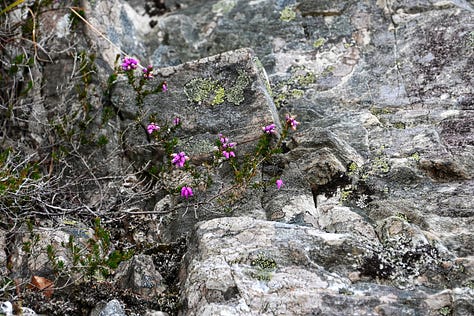
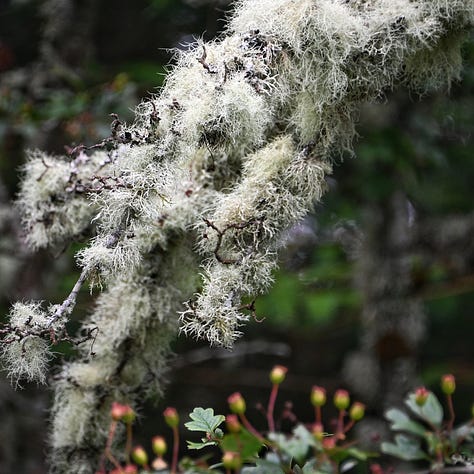
I had also brought with me a bag of fabric scraps ‘just in case’, and so I began to stitch the view, into cloth and into me. I found the colours of the sky and the changing flank of the mountain and the way the wind moved and I made them visible, little by little every day.
Making some art instead of just sitting there, small and passive, transformed what could have been just a relaxing break into something deeply, deeply meaningful. It reaffirmed something I knew but had forgotten: real magic happens when you don’t just look, but respond. Make the art. Write the words. Here is a way to reach out and touch the world without harming, without spoiling or controlling or demanding. Here is a way to offer love and thanks.
On letting yourself be everything
A life with chronic ill-health has brought many lessons, but one of the hardest and longest has been that my body will continue to produce its cacophony of distracting, unpleasant symptoms on the best, brightest, most joyful days as well as in life’s shadows, so it’s best, in the end, to learn how to relax, laugh, and enjoy things anyway. It is only sensation. I can breathe and I can handle it and it will pass again. Nothing bad is happening to me: my body is just noisy.
The mountains, it turns out, are excellent company in this regard, their countenance changing hourly in swoops of light, shadow, shifting colour and cloud. Occasionally, the whole view from our cabin would disappear entirely as the cloud came down: so remarkable it was, you couldn’t help but shout. Other times, in a burst of glorious sunshine, what had been a soft, dark smudge of charcoal on one side of the mountain was erased in an instant, like someone had licked their thumb and wiped it clean, revealing bright, emerald green.
If you come here carrying pain, the land offers a good example. Be fluid. Let it all flow in and out, light and dark. You don’t have to stay one thing.
On discovering what actually connects with you
It’s easy to decide in advance what you will like and not like about an experience. It’s much more fun to discover the more real truth on the fly, as if everything was happening to you for the first time, because it always is, really, or can be if you let it.
It was important to me to keep pausing and rediscovering what felt good, what was connecting with me and what wasn’t. There is lots of fascinatingly honest self-knowledge to be found in that.
I loved the sheep: I was properly, profoundly delighted by the silly sheep who wandered past our windows in a rhythm of morning and evening processions. I loved the cabin’s boiling water tap that meant you could have a cup of tea in an instant, and the heavy stone mugs and colourful teapots — I spent a lot of time holding them, reverent, happy. When I sat to read, I found I wanted to read fairytales and children’s books, nothing adult, nothing ‘grown-up’. I loved the pebbles that surrounded the house, the same kind that spread across the beach, that glittered strangely when damp in a way I hadn’t seen before — mica rich, flat and warm. I loved the driftwood jumbles, finding lengths of twisted plastic fibres and putting them in my pocket. I loved having the doors open and just listening and listening. I loved the mountains most of all, the way their skin was velvety and muscled, the way they looked like great sleeping beasts. I could feel them breathing.

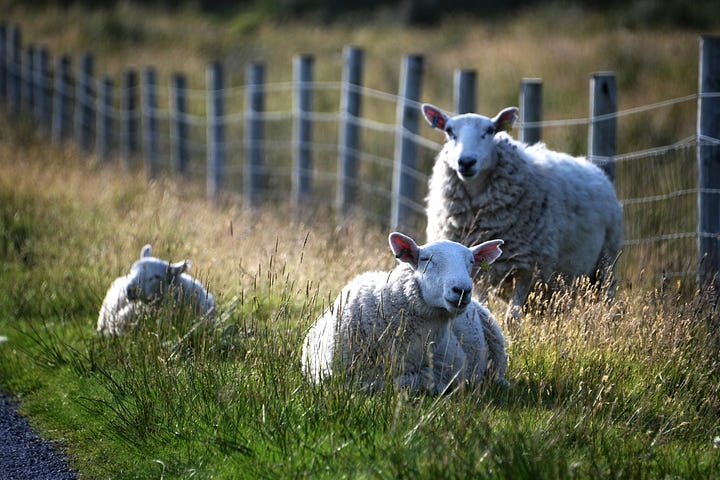

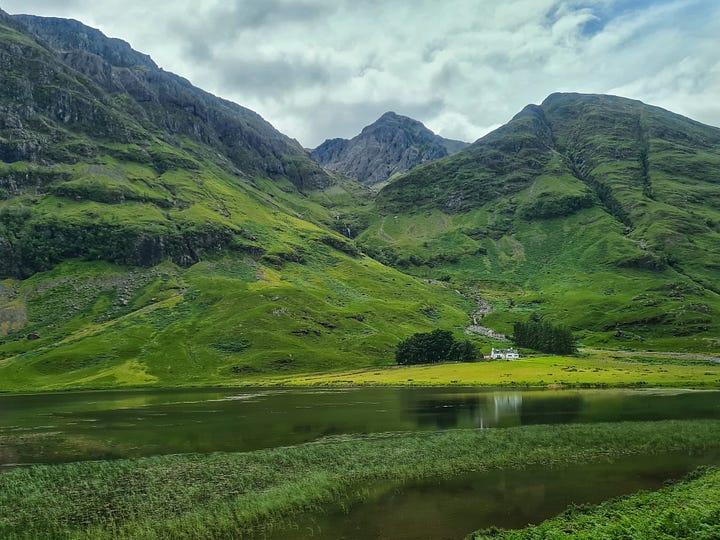
On risk
How interesting it is when you find something that scares you. The winding drives up and down the painfully steep, single-vehicle tracks that curved and dipped with sheer drops around the mountain passes caught me wholly by surprise, naive and so used to urban environments as I am. F is a good driver (although our hire car had a horrible, weak clutch) and I trust him with my life, and yet I found myself white-knuckled, gripping the car door, my stomach like rock, my throat tight, struggling to breathe. My thoughts weren’t anxious — my body simply froze in terror. There was nothing I could do. Over the week, I learnt to simply hang there, breathing slow, in and out, as if I was suspended like a buzzard.
And yet. And yet. Oh the views from the top. Oh the sweeping, magnificent spread of world and life, of time itself; a rare, rare view of the forces that made everything. How could I not give my whole heart to it, in the end?
Seeing something that you’ve never seen before may require you to feel afraid, but I am reminded again that the experience of fear itself is nothing to be afraid of: it’s just a different way of feeling, being, experiencing. Fear is the price you pay to be made a little bigger.
On going home again
Of course, I cried when it was time to leave. The thought of going back to my dark little urban house with views of only bricks and weeds felt unbearable. I could see how bitterly I could return. I could feel how what had started as a gem of an experience could be allowed to harden, fester, how I could clutch at it like Golum to his ring.
I sat writing on the beach on the last day — with a bit of heavy effort, we could just about get me across the pebbles to the tarmacked lane where I could get in the wheelchair, then F could wheel me down to the edge of the shore where I could wander just a little. I rested against a huge log, blackened by age and fire and weather, my notebook on my knee.
Here is what I wrote:
“I will miss feeling so connected to something bigger, something breathing and conscious all around me, but of course I get to take that home with me. It may be more obvious here, but the same presence I feel in the grey, diffuse cloud, sitting low on the mountain like a spirit is the same presence I feel in the old, litter strewn lime tree at home that tugged at my hand last week when I went over to touch and talk to it. It is in the overgrown garden, the weeds, the house too. I do not want to go back resentful, ungrateful for my ‘real’ life. I want to go back freshly opened, newly devoted, thankful, eager to keep looking and listening and discovering magic everywhere. Here, I may get to see the Morse code flashes of white light on the rippling sea, the rusty seaweed, the raindrops caught in the nets of seagrass, but it isn’t better than home. It is more like seeing a beloved in a new place, in new clothes. The joy of seeing Fraser here in his homeland, donning his kilt and his long socks in eager, boyish glee, made me love him more, but I do not love him less when we leave. The love just grows and comes with us.
This is what seeing more of the world does, or can do, I realise. It just lets more love in. It just gives me more faces and moods and sights to fall in love with, more things to gather up and hold forever. An ever-expanding love.”
Thank you for reading this. Thank you for coming with me, and for coming home with me again.
Now, this is important:
Sophie and Sarah who run Turadh are very, very keen to connect with you too. If you live in Scotland and work to help improve the lives and wellbeing of those around you, or the bigger world itself, and would benefit from a similarly restorative, transformative break at low cost, please do check out their website and get in touch with them. They would also like to extend this invitation to anyone in Scotland who may not work but who is struggling with or recovering from ill-health and disability — although the property isn’t currently suitable for wheelchair-reliant users, anyone with a little more mobility who is able to walk on the pebbled ground would be fine.
Please say yes to this opportunity. It is the most beautiful place to rest. And please do share with anyone you think might benefit. Thank you so much.
And thank you, S&S, for everything. I hope these words can show what a precious gift you have given me.
You’re reading a bimblings — my heartfelt offering to a generous universe. If you subscribe, you’ll receive one or two posts like this a month. They’re always free and offered with love. Upgrading to a paid subscription is entirely voluntary but a vital source of support to help keep me writing and to protect my livelihood. Paid subscribers also receive occasional, extra, behind-the-scenes news about my personal life, book-writing, art practice, loves and losses, plus more on how I navigate life with a body that doesn’t work so well. If subscribing isn’t for you, perhaps you’d like to buy me a coffee instead? It all helps me and my family enormously. Thank you so much for being here.






I read a thing about moral philosophy recently which drew a distinction between two attitudes to the world, two 'stances': choosing-controlling, and accepting-appreciating. The first, of course – 'choosing-controlling – is supercharged by both capitalism and individualism, and is so widespread most of us don't even realise we're doing it, or that there can be another way. The second is rarer, and perhaps getting rarer still, but it's completely central to a way of relating to nature, particularly, that isn't extractive, that might be less harmful. And of course, the 'accepting-appreciating' stance goes further, and describes healthy human relationships, too. And it seems to me – as this post reminds me – that you are the epitome of the accepting-appreciating mode, and an example for the rest of us to follow x
I cannot think of anyone more deserving of such a wonder-reawakening experience Josie 🤗 Thank you for so generously sharing it here.